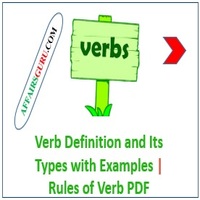Verb Definition and Its Types with Examples | Rules of Verb PDF
Any word that denotes an action is verb. Hence verb is also called ‘doing word‘.

Types of Verbs
Verb can be classified into two categories.

- ‘Used to’ acts as both ‘modal‘ and ‘adjective‘.
- Auxiliary Verbs : They are used in addition to other verbs. These are also called helping verbs.
- Modal Auxiliary Verbs : They are also called helping verbs. Can, Could, may, might, shall, will, should, must and ought to are called Modal Auxiliary Verbs.
E.g.: 1. (a) She can run fast. [Where ‘can’ is a modal and ‘run’ is a main verb.]
(b) You should study English. [Where ‘should’ is a modal and ‘study’ is a main verb.]
2. Marginal Auxiliary Verbs : Used to, need and dare are Marginal Auxiliary verbs. These modals can be used as a main verb (Need & Dare) or an adjective (used to) in a sentence.
E.g.: 1. I am used to sleeping late at night. [Where ‘am’ is a helping verb and ‘used to’ is an adjective and ‘sleeping’ is a Gerund]
2. (a) I need you. [Where need is a helping verb]
(b) You need not come tomorrow. [Where ‘need’ is a helping verb and ‘come’ is a direct infinitive]
3. (a) She does not dare to come home late. [Where ‘dare’ is a modal verb and ‘to come’ is an infinitive]
(b) I dare not enter his room without permission. [Where ‘dare’ is a helping verb and ‘enter’ is a direct infinitive]
Important Points on Auxiliary Verbs
Rule 1
Modal Auxiliary verbs are not used as main verbs. They are only used as helping verbs.
E.g.: I can lift this box. [Where ‘can’ is a helping verb and ‘lift’ is a main verb]
He should work hard. [Where ‘should’ is a helping verb and ‘work’ is a main verb.]
Rule 2
Modal Auxiliary verbs are not used in V1, V2, V3, ‘ing’ or ‘s/es’ form. Their forms do not change with subject, person or number.
E.g.: She can help you. [Where ‘help’ is first form of verb (V1)]
You should understand your friends. [Where ‘understand’ is a first form of verb (V1)]
Rule 3
‘Ought’ and ‘used’ is always followed by infinitive ‘to+V1‘.
E.g.: We ought to respect our parents. [Where ‘to respect’ is to + V1]
He used to come late. [Where ‘to come’ is to + V1]
Use Of Modal Auxiliary Verbs
CAN & COULD
Rule 1 : Can denotes power, ability and capacity.
Could denotes past ability, power or capacity.
E.g.: He can lift the box.
I could not come yesterday.
Rule 2 : Can is also used for taking/ giving permission.
E.g.: You can go now.
Rule 3 : Can denotes theoretical possibility.
E.g.: Everyone can make a mistake.
Rule 4 : Could is used to show remote possibility.
E.g.: There could be a bomb under your seat.
Rule 5 : Can shows friendly request; while could shows formal request.
E.g.: (i) Can I take your scooter?
(ii) Could I talk to Mr. Shukla?
Note : Both ‘able to‘ and ‘could/can’ show capacity. Hence they are never used together in a sentence.
E.g.: I cannot be able to come tomorrow. (×)
(This is superfluous sentence. The word ‘superfluous’ means more than required.)
The correct sentence is :
I cannot come tomorrow. (✓)
I will not be able to come tomorrow. (✓)
MAY, MIGHT & MUST
Rule 1 : ‘May’ shows possibility.
E.g.: It may rain tonight.
Rule 2 : May expresses willingness in an optative sentence.
E.g.: May you you live long!
Rule 3 : We use ‘may‘ in subordinate clause if Principal clause is in present tense, and the subordinate clause starts with that/so that/ in order that and the subordinate clause denotes a purpose.
E.g.: We eat so that we may live.
Rule 4 : Might shows less possibility. May expresses possibility (neither low nor high).
E.g.: (i) He might pass the exam but seeing his intelligence I don not have much hope.
(ii) It may rain tonight.
Rule 5 : Must shows greater possibility.
E.g.: He stays in five-star hotels and travels by air. He must be rich.
Rule 6 : When ‘May‘ shows respect/request, it is always used in interrogative form.
E.g.: ‘May’ I come in?
Note : Possibly/likely is never used with may.
E.g.: (i) He may possibly come tomorrow.
This sentence is superfluous. (×)
(ii) He may come tomorrow.
(iii) He will possibly come tomorrow. (✓)ds. Instead simple present tense is used.
E.g.: If. as soon as, in case, provided, unless, until, before, after, when.
What is a verb and its type?
Candidates can download the Verb and its type PDF by clicking on below link.
Verb Definitions and Its Types with Examples
More Modals will be posted soon….
All the best for your upcoming exam!
You can join or visit at Facebook Page or Twitter for always keep in touch with further updates.
Read more articles….

affairs guru is just excellent,thanks a bunch for providnig the download links as well.